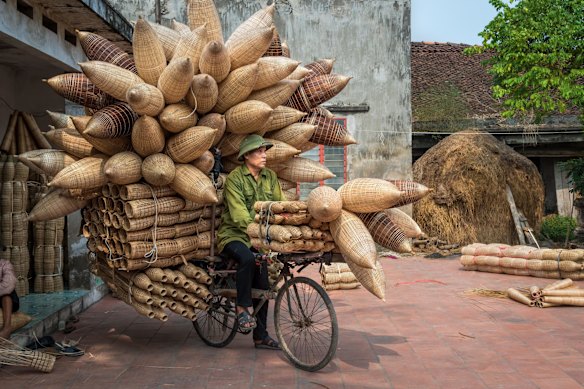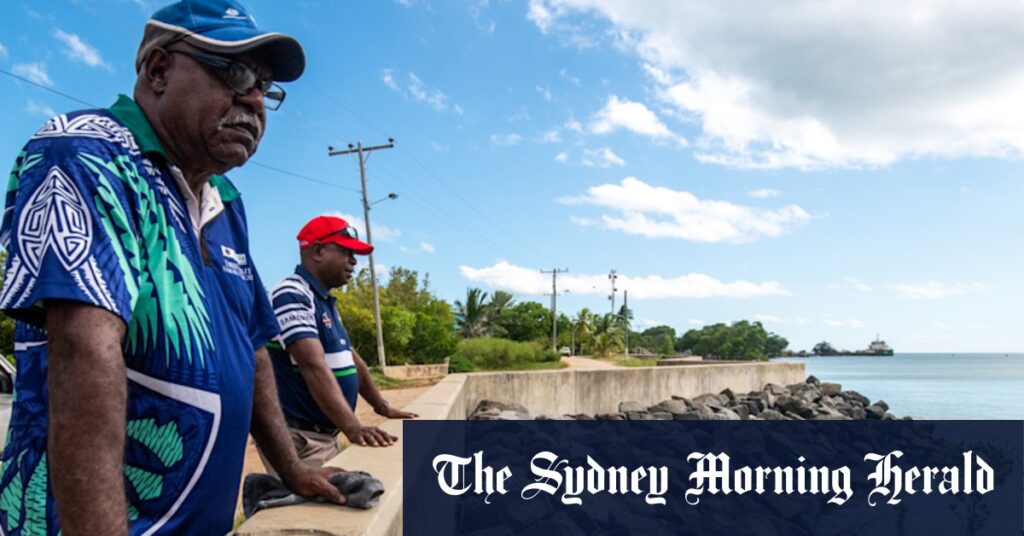The government is sure to give far more weight to Justice Michael Wigney’s judgment that it has no legal duty of care to protect Torres Strait Islanders from the ravages of climate change than to his other remarks, cogent as they are (“Commonwealth not liable for ravages of climate change in Torres Strait”, July 16). The judge’s litany of environmental impacts on the islanders – trees dying, soil salination, beach erosion and coral bleaching, to mention a few – is compelling evidence that there is a “very real risk … they will lose their islands, their culture and their way of life and will become, as it were, climate refugees”. It’s quite clear, therefore, that while the government may have no legal obligation to safeguard its citizens from climate harm, it has a serious moral duty to do so. If Australia is to succeed in its ambition to partner with Pacific Island nations and host the 2026 COP conference in Adelaide, it must match that ambition by refusing to approve new and expanded fossil fuels projects in Australia. Tom Knowles, Parkville (Vic)
Torres Strait Island elders Uncle Pabai Pabai and Uncle Paul Kabai at court with their legal advisers. Credit: Australian Climate Case
The Albanese government is denying their duty of care, just like Opposition Leader Sussan Ley did when she was environment minister. This is tragic for the Torres Strait island people considering the terrible damage that has been done already. The judge was scathing of the former Liberal government and found the climate damage proven in fact, but a duty of care not allowed in the common law. But there’s nothing from the Albanese government, they just keep expanding coal and fossil gas production and don’t offer the help needed to protect the islands. It’s time to put a disaster and adaptation levy on fossil fuel exports, as their pollution is driving climate chaos and destroying the Torres Strait islands. Allan Rees, Moruya
Granny flats
The NSW government must be commended for its Housing Pattern Book initiative (“Mini-Aussie dream for a much lower rate”, July 16). I encourage the government to go further. The pattern book designs would appear to require the demolition of existing homes to enable their replacement by two or more dwellings using traditional construction methods. This is likely to be time-consuming and costly. I believe it should be supplemented by a scheme that expands the current granny flat regime to increase the permitted size (say from 60sq m to 100sq m) and permit subdivision from the principal dwelling, adding to supply and reducing cost. It would facilitate the adoption of sustainable modular housing. The Housing Pattern Book could be expanded to include a range of designs for the new granny flats. David Rohr, Avalon Beach
There are some wonderful units in my suburb that I would happily move into, releasing both the asset value of our property for our and our children’s use, and a largish four-bedroom terrace for a family. However, it’s the fact that 75 per cent of the other owners of the unit block can decide to sell and force me to sell that prevents me from even considering such an action. This must be one of the most ill-considered pieces of legislation ever. Rob Hosking, Paddington
Powerful allies
The idea that no one could be bothered attacking Australia is a comforting fantasy (“Let’s not spend a bomb on defence”, July 16). The Japanese certainly weren’t deterred from reaching our doorstep in 1942, and Australia’s mineral wealth and potential for solar power generation make it a worthwhile target for any aggressor seeking to expand its resource base. Hence, the need for powerful allies and meaningful deterrence. Ross Gittins may well be right that Donald Trump is aiming to sell more US defence equipment, but when the Baltic states, Poland, the US and Greece are spending 3 per cent or more of GDP on defence while Spain and Italy are spending 1.5 per cent or less, it’s obvious that some are doing the heavy lifting while others are just along for the ride. Doug Walker, Baulkham Hills

A Royal Australian Air Force pilot from prepares for a training exercise.
Thank you, again, Ross Gittins for putting this arms race into perspective. From what I hear and read about America’s living standards, health, education, housing, safety and the environment are all regressing – but they do have some cool weaponry! Mark Paskal, Austinmer
Like Ross Gittins I have also been wondering why Australia and many other countries are being urged to increase defence spending. Who is behind this, and what are they expecting, or perhaps hoping for? Is it arms manufacturers, who would have nothing to lose and everything to gain? The militia? Ambitious, delusional leaders like Trump, Netanyahu and Putin, who are already destroying the lives of millions of ordinary people? The most worrying thought of all is that, if successful, the build-up of arms could become a self-fulfilling prophecy, resulting in wars that no rational citizen of any country wants. The future of children and grandchildren all over the world depends on the wisdom and negotiating ability of today’s political leaders. Razing cities and killing millions solves nothing at all. Corin Fairburn, Bass
Cracks in AUKUS pillars
Michael Cronk, (Letters, July 15), extols the value of Pillar Two of AUKUS, supposedly dealing with information sharing over a range of “advanced technological and electronic developments”, including AI. I say supposedly because we don’t know what it will all entail and how much of anything will be shared. The government has been very reticent when asked about details. Nor do we know what the current US “review” will decide – and importantly how much more it all might cost us, including the nuclear subs (if we ever get them). Both pillars of AUKUS are showing large cracks and need very close examination before any weight is put on them. Eric Hunter, Cook (ACT)
Absorb fee costs
The card surcharges that banks impose are simply one more example of business trying to gouge customers while simultaneously pretending that the cost of their services is less than it really is (“Card surcharge ban risks price rises, job cuts”, July 16). It is a pernicious rip-off that risks spreading to the obnoxious levels shown in American healthcare, where mothers are charged $100 for “chest-time” after the birth of their baby. One of the refreshing aspects of Australian culture, often noted by visitors, is the transparency of advertised prices. You pay what the ticket says. We risk losing that. How soon before we are charged for walking through an automatic door, or for use of a bank pen? Banks, these are your ordinary costs. Running card payments is one of your jobs. Absorb them or raise your prices, and stop this dishonest pretence that there is something special about using a card. Stein Boddington, St Clair

Readers think card fees are a rip-off.Credit: iStock
Admit defeat
I cannot see the point in unsuccessful Bradfield candidate Gisele Kapterian continuing with her pursuit of trying to overturn the election result (“Fight for what’s left of the party”, July 16). A change in result would achieve nothing politically except to add one paltry seat to the political rump that is the Liberal Party. Sadly, her pursuit does achieve one thing and that is to call into question one of this country’s most treasured institutions – our wonderful, entirely independent Electoral Commission. Counts and recounts have been done. A result has been declared. Drop your sense of entitlement. Accept the result, then start preparing, as Nicolette Boele did over the past three years, for the next federal election. Bill Young, Killcare Heights
Predictably, as soon as the Liberal candidate has exercised her right to take the result in Bradfield to the Court of Disputed Returns, the usual pundits come out suggesting the Liberal Party has a “born to rule” attitude and she should not bother. That seems to make the Court of Disputed Returns irrelevant. Or is it the case that a candidate is denied the right to go to the court because she is a member of the Liberal Party? And any suggestion that the result might be overturned goes against your correspondents’ genuine belief in the new natural order, that Bradfield must be represented by teal independent Nicolette Boele. I suggest, as Ms Kapterian has emphatically said, that we should leave it up to the court. Dennis Bluth, Cammeray
Instead of adding to the High Court’s already considerable workload, can I suggest a much quicker and cheaper option for the “video umpire” that Gisele Kapterian has requested to rule on 800 ballot papers in dispute. As a semi-retired pharmacist living in Bradfield, I would be happy to gather a group of former pharmacist colleagues, all with decades of experience in deciphering handwritten prescriptions of varying degrees of legibility. We should be able to sort out the dodgy numbering on the disputed ballot papers within a few hours. Problem solved. Judy Gowland, East Lindfield
Pedal power
I read with bemusement the competing views about use of bicycles in Sydney (Letters, July 16). I’m in Ho Chi Minh City in Vietnam, where most of the population (roughly equal to Australia’s entire population) transport themselves, their families and their goods on motorbikes and bicycles. They get there faster than cars, whose bulk takes up the space of about six bikes. Nearly all taxis are locally produced electric vehicles and there are more electric bikes and buses. All drivers share the space and respect pedestrians, unlike Sydneysiders who defy others to impinge on their road. Rod Lander, Stanwell Park

Bicycles have many uses in Vietnam.Credit: Shutterstock
Tax: enough already
There seems to be something in the water, with folks arguing in favour of taxation, that governments should encourage us to be proud of paying tax and that the federal government has a revenue problem best solved by taxing us more. There are frequent calls for this or that to be taxed if it’s not or taxed more if it is, which makes me shake my head. Two decades ago, about 19 million of us paid an average of $10,000 a head in federal tax. Today, about 26 million of us pay an average of $25,000 a head. I would suggest that Canberra has taken more than enough to do what they need to do, thank you. Don’t dig your hand into our pockets any deeper – rather trim your sails to the prevailing conditions. Chris Mangan, Bracken Ridge (Qld)
Policy derailed
Here is some more “fuel for thought” (Letters, July 16). After energy production, transport is our biggest challenge in reducing emissions. The biggest offender is air travel, then diesel-powered trucks, SUVs and mega-utes. The electrification of cars and trucks will only have limited benefits in achieving emissions targets. It’s been demonstrated over and over again that by far the most cost-effective way to move people and freight is by electric-powered rail, especially over the long haul. But in this country we don’t base public policy decisions on science and evidence, but allow vested interests to determine our future. Chris O’Rourke, Bathurst
Your correspondent Ian Adair is correct that green steel is not here yet (Letters, July 16). The trouble is that it never will be if we take no steps towards it. The same is true of any progressive idea to improve humanity’s chances of survival on the only planet we have. We need to stop the naysaying and do something. Ron McQuarrie, Budgewoi
Only truckies know
My word, I have hit a nerve with my trucks-in-the-wilderness comment (Letters, July 15). Clearly my detractors have never been on any outback bush tracks and have never driven a truck. I have. A solar panelled truck, (which in itself is currently laughable), carrying enough batteries for night driving would be so heavy it would sink into the saltbush sand, let alone when carrying heavy freight. Keep dreaming people. David Sayers, Gwandalan
Chasing shadows
Recent discussions on these pages about foreign-made cars are close to home. My German car constantly warns “caution pothole”. It has never yet correctly identified a pothole of any description but does its best to stop me from dodging real ones. It also emergency brakes at shadows. Raise this and other electronic issues with the dealer and they just shrug. They’ve heard it all before. I just hope that none of this new car technology is finding its way into the aircraft industry. Ian Costley, Belrose
Adding value
Prime Minister Anthony Albanese claims that he wants to add value and manufacture things in Australia, but the opposite is happening. For example, gas is a large component used in the production of fertiliser and plastics, which are used extensively across Australia. However, because of the shortage of gas for use in Australia, the Australian plants that manufacture these fundamental and essential commodities have now closed. Australian gas is exported in huge quantities to Asia, where these products are now made and exported back to Australia. The value-adding manufacture, along and the many jobs and associated skills, have thus also been exported. It appears that the last paper manufacturing plant in Australia, in Tasmania, will also close because of the lack power to operate the plant – power that was promised but not delivered by the PM. Keith Askew, Hornsby Heights
Wild language
On the travails of dictionaries (Letters, July 15), in 2015, vigorous protests and a petition of 50,000 signatories opposed Oxford University Press’s removal of many nature words from the Junior Oxford Dictionary. Out went the likes of acorn, cygnet, hamster, ivy, magpie, meadow, mistletoe, panther and willow. In came techno-jargon, such as analogue, blog, bullet-point and chatroom. Triumphantly, in 2018, The Lost Words: A spell of words, written by Robert MacFarlane and illustrated by nature artist Jackie Morris, was crowd-funded into existence. This book “rewilded” the language with the nature words excluded by Oxford. Within a year, it had won two literary prizes and sold 75,000 copies. A school bus driver raised enough money to provide a copy to every school in Scotland. The “disestablishment” of Australia’s National Dictionary Centre warrants such a spirited response. It uniquely charts not only language but social history and, once gone, would be an irrecoverable loss. Barbara Chapman, South Yarra (Vic)
We are family
Soon after guardian angels (cleverly disguised as nurses) helped my fiancé perform the miracle of bringing new life into the world, I let her mum know “all is well”. She then relayed the news to her mother. It was not lost on me that the little creature wriggling in her arms had an unbroken line of descent stretching back time out of mind, all the way back to a mother, perhaps recently descended from the trees, who once held a much furrier baby in her arms. Millions of years later we all ultimately share in just one tree of descent. As your correspondent Trevor Somerville says: “We are family” (Letters, July 16). Ronald Elliott, Sandringham (Vic)
- To submit a letter to the Sydney Morning Herald, email [email protected]. Click here for tips on how to submit letters.
- The Opinion newsletter is a weekly wrap of views that will challenge, champion and inform. Sign up here.
Read the full article here
